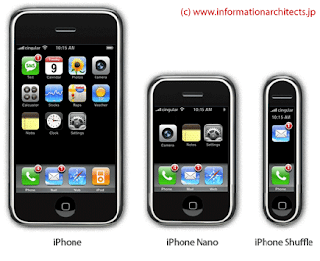
Something big is going on in the handset market, which appears to be developing clearer customer niches as device capabilities start to diverge. But the big thing isn't simply the handset proliferation. The proliferation of devices is creating lots of niches, and also showing why mobile is such a powerful way to do voice.
It isn't simply mobility. It is the ability to create human affinities for communications services never possible before. Marketers talk about "branding" their companies and services to create an image of quality, reliability, dependability, fun or some other attribute. But who really believes them?
Most consumers seem to regard every mobile provider as a functional substitute for some other provider. Ford or Chevy. There are brands. It simply isn't clear that the brands mean much.
But consider perfume. Perfume is so personal that the branding is everything, the actual fragrances like operating systems. Perfumes also are ultimately personal. A person doesn't buy a different perfume because it is on sale. And on what logical basis would any fragrance be "better" than another?
Of course, that's not the point. It isn't about "better." It is about "me." The whole point of perfume marketing is to create an indelible sense that a fragrance is the personification of "me." That's sticky. That's loyalty. That's the complete antithesis of a commodity.
Wireline service is nearly impossible to personalize. But wireless service is nearly infinitely capable of segmentation, personalization and creation of niches because the handsets personify the service. This is a very big deal.
But back to HTC. It isn't clear yet whether the touchscreen interface itself will become into an actual niche, but that feature certainly is associated at the moment with devices we might say are "fashion phones." And there are two devices clearly in that category using touchscreen technology: the iPhone and the HTC Touch.
As iPhone sets records for sales of the first million units of a new handset, Taiwanese phone maker HTC says it has sold approximately 800,000 units of its Touch smartphone as well, over just about the same timeframe. While not yet available in North America, the Touch features the same sort of touchscreen interface used by the iPhone.
Both the Apple and HTC Touches have touchscreens, Wi-Fi and media playback.
HTC has already announced a successor to the Touch, the Touch DUAL, a phone that adds 3G broadband and a slide-out keypad, borrowing concepts from Research in Motion's BlackBerry devices. It should launch in Europe later this month.
Originally an equipment maker for carriers and other handset vendors, HTC in the last two years has embarked on a major campaign to sell its own branded phones. The company specializes in innovatively designed handsets and mobile computers, many of them aimed at the enterprise market.
Like most HTC devices, the HTC Touch and the Touch Dual use the Microsoft Windows Mobile operating system.
The company also has launched three other devices: a 3G version of the ultramobile Shift computer that runs on Windows Vista; the P6500, designed for tough environments such as hospitals and police forces; and the S730, an update to its popular S710 phone that like its predecessor includes a slide-out qwerty keyboard in addition to a traditional mobile-phone keypad.
Even the "fashion" segment is going to evolve. Verizon is rolling out devices aimed at the more price conscious end of the fashion segment, especially where what is really needed is voice and text, without heavy Web, media player or email support.
As it seems to be turning out, though mobile phone "service" might be something of a commodity, the handset experience is anything but, and getting richer all the time. That essentially means mobile service is the closest communications equivalent to "perfume," clothing, music and other human products that have very high and very personal human meaning.
















